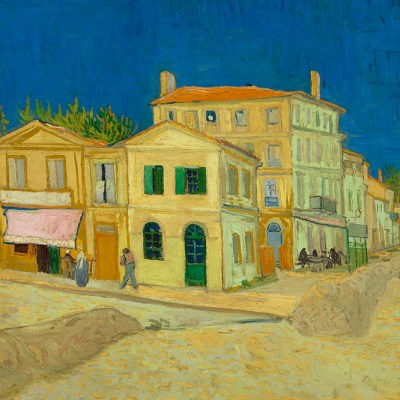On Friday, two climate activists who threw soup over Van Gogh’s Sunflowers (1888) at the National Gallery in October 2022 were sentenced to prison. Just Stop Oil activists Phoebe Plummer and Anna Holland were found guilty of criminal damage in July this year. Plummer was sentenced to two years (and three more months for taking part in a slow march in west London in November 2023). The painting was unharmed by the attack, although there was minor damage to the frame. The judge, Christopher Hehir, said he had to take into account not only the harm the defendants had caused, but also the harm that might have been caused: ‘The pair of you came within the thickness of a pane of glass of irreparably damaging or even destroying this priceless treasure and that must be reflected in the sentences I pass.’ An hour after the sentences were handed down, reports the Art Newspaper, three Just Stop Oil activists protesting against the sentence were arrested for throwing soup over Van Gogh’s Sunflowers (1888) and Sunflowers (1889) – the latter on loan from the Philadelphia Museum of Art for the ‘Van Gogh: Poets and Lovers’ exhibition.
UNESCO has said that the threat to Sudan’s cultural heritage has reached ‘an unprecedented level’. In a statement released earlier this month, it outlined reports of looting at the National Museum of Sudan in Khartoum, which has been undergoing restoration since 2019 with Italian funding. On 13 September, Ikhlas Abdel Latif, head of museums at the national antiquities authority, told AFP that many archaeological objects had been taken in lorries to border areas. The Rapid Support Forces (RSF), the paramilitary group that controls the area, denies that it is responsible for the looting. UNESCO said it is also checking reports of looting from the Khalifa House Museum in Omdurman and the Darfur Museum in Nyala. It cautioned the art trade against taking part in the removal of artefacts or being involved with their subsequent sale. The civil war in Sudan began in April 2023 when fighting broke out between the Sudanese army and the RSF. An estimated 150,000 people are thought to have been killed so far, more than seven million are internally displaced and some two million have fled to neighbouring countries.
The Ukrainian president Volomydyr Zelensky and his wife Olena called this week for the ‘decolonisation of Ukrainian art’ after visiting the Ukrainian Museum in New York, reports the Art Newspaper. The Zelenskys, in town for the United Nations General Assembly, officially opened the exhibition ‘Alexandra Exter: The Stage is a World’. The show explores the artist and designer’s work from 1913–34, paying particular attention to her formative years in Kyiv and the inspiration she drew from Ukrainian folk art. On social media, they wrote ‘it is important to return to Ukraine the artists appropriated by Russia’. The museum has recently hired the Kyiv-based art historian Oksana Semenik, who, after the Russian invasion in 2022, started a twitter account about Ukrainian art that has prompted many museums to relabel works and artists previously described as Russian as Ukrainian.
The Art Newspaper reports that the curator Virginia Brilliant has dropped the lawsuit she filed in May against Robilant + Voena and the gallery’s founders Edmond di Robilant and Marco Voena. Brilliant had been seeking $3 million plus additional damages and payment of her legal costs for complaints that included breach of contract, the creation of a hostile workplace and going back on an agreement to pay for her medical treatment. The dropping of the suit is part of ‘a confidential settlement by which all parties are bound’, Brilliant’s lawyer told the Art Newspaper. A spokesman for Robilant + Voena said, ‘We are glad this unfortunate matter is behind us.’
On Thursday, the heirs of a former director of the Mauritshuis filed a lawsuit requesting the return of the works he bequeathed to the museum. The two claimants say that the Mauritshuis has violated the terms of Abraham Bredius’s will by not keeping all the works he left it on public display. Bredius, who was director from 1889–1909, bequeathed the museum 25 works including works by Rembrandt such as Saul and David and Homer, as well as by lesser-known Dutch masters. The claimants, the great-niece and great-nephew of Bredius’s companion Joseph Kronig were shocked, they say, when on a visit to the Mauritshuis in 2021, only four paintings from the bequest were on show. ‘It’s a slap in the face of Abraham Bredius. If he had known this, he wouldn’t have done that bequest,’ Otto Kronig told the New York Times. A lawyer for the Kronigs told Dutch publication NRC that money is not the issue: ‘from our side it is, what is a will worth’. A spokesman for the Mauritshuis said the museum is unable to comment on an ongoing investigation.



